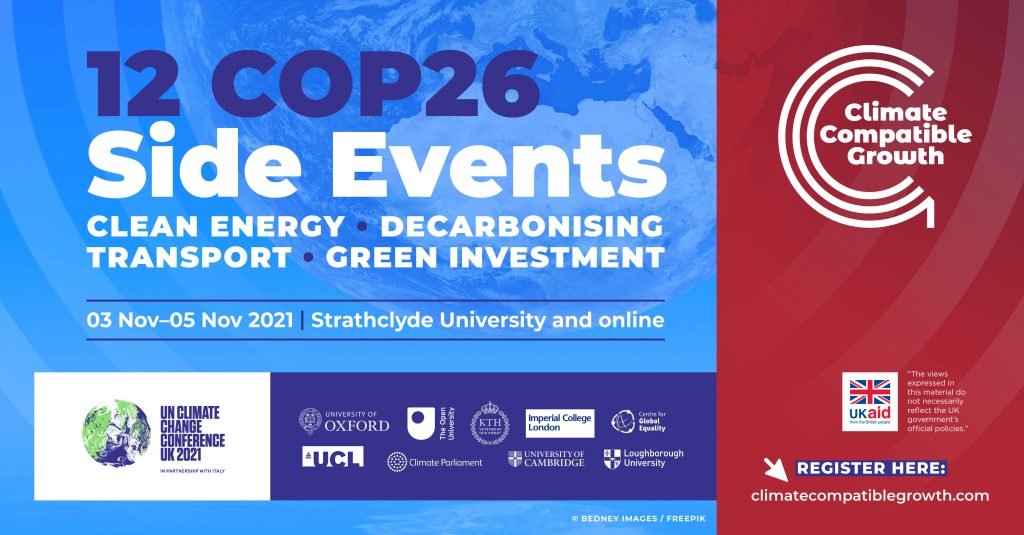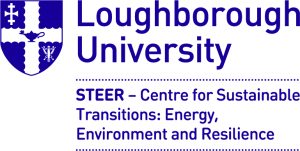CCG COP26 Side Events


Event Details
(This event has now ended)
Climate Compatible Growth Programme: CO26 Side Events
Nov 3 – Nov 5 2021
Strathclyde University & Online
CCG is hosting three days of events during COP26 including the launch of funds, papers, and the new Loughborough Centre for Sustainable Transitions: Energy, Environment and Resilience (STEER). Speakers from the ADB, FCDO, GIZ, EEG, HVT IAEA, IEA, IRENA, UNECA, SE4All, SuM4All, World Bank Group, and many more will join panel discussions across 12 Side Events focusing on energy, transport, and sustainability.
Day 3 of the COP: 03 Nov 2021
Session 1: Ecosystem for change: Join the CCG movement [Youtube Link for Full Video]
09h00–10h30 GMT
This will focus on partnerships and co-created research. These sit at the heart of key organizations that are instrumental to empowering governments to deliver carbon compatible growth. We highlight selected international partnership activities, including:
- The development of public goods and activities, including Regional SDSummerSchool(s) & Energy Modelling Platforms, Starter Data Kits, Open Toolkits, OpTIMUS community of practice, Round Table Principles and others
- And how to engage in open platforms or fora, programmed research, agile outputs, partner, or contribute in-kind or co-fund CCG to scale impact.
Chair
Yacob Mulugetta | CCG/UCL
Brief presentations by panelists, followed by chaired discussion.
Panelists
Charlotte Watts | Chief Scientific Adviser, FCDO
Jim Watson | CCG / UCL
Huang Wei & Loreta Stankeviciute | IAEA
Asami Miketa | IRENA
Nicolina Lindblad | World Bank Group
Mekalia Paulos | UNECA
Arnaud Rouget | IEA
Session 2: Evidence for COP26: bridging the evidence-policy gap [Youtube Link for Full Video]
11h00–12h30 GMT
This session will discuss five policy briefings commissioned by the CCG programme for the COP26 unit in the UK government. These briefings, along with several others, were commissioned to feed into the Energy Transition Council dialogues between the UK and a group of low- and middle-income countries. The session is an opportunity to hear briefing authors discuss their results and policy implications, and a response from Hana Chambers from the UK government’s Cabinet Office.
Chair
Prof Jim Watson | CCG / UCL
Session Format: 10 minute presentations by panelists, followed by chaired discussion.
Panelists
Dr Stephanie Hirmer | Energy Power Group, University of Oxford / CCG
Introduction to the policy briefings
Dr Chris Matthews | Institute for Mineral and Energy Resources, University of Adelaide | Dr Khalid Amrouch | University Mohammed VI Polytechnic
Morocco: A key player in Climate Compatible Growth (see policy brief)
Sarjiya | Center for Energy Studies, Universitas Gadjah Mada
Generation Expansion Planning with a Renewable Energy Target and Interconnection Option: A Case Study of the Sulawesi Region, Indonesia (see policy brief)
Mulima Mubanda | Zambia Institute for Policy Analysis and Research
Mind the gap in your recovery: why inclusive climate action matters (see policy brief)
Dr Tiago Diniz | Electrobras CHESF
Achieving a high share of non-hydro renewable integration in Brazil through wind power: regional growth and employment effects (see policy brief)
Saritha Sudharmma Vishwanathan | Indian Institution of Management
Assessing NDC and climate compatible development pathways for India (see policy brief)
Hana Chambers | Head of Energy Transition at COP26 Unit, Cabinet Office
Launch of the Highway Development and Management Model (HDMM) under a new Multi-donor Trust Fund [Youtube Link for Full Video]
12h30–14h00 GMT
The session will focus on how to incorporate Climate Issues into Highway Planning and update the existing HDM-4 model via the launch of HDMM and the new trust fund. HDM-4 has for many years been the primary model, used by Governments and Development Banks, to plan and manage the major road networks of low-and-middle income countries. By 2015 it was estimated that US$ 35 billion of road works had been evaluated by the model.
The model has been developed by an international research collaboration, carried out over the last 50 years, and contains a wide range of engineering data and relationships relating to road pavements, road maintenance and vehicle performance and vehicle operating costs. With Climate Change and extreme events affecting the performance roads, the onset of a big shift towards electric vehicles, and concern over vehicle emissions, it is an opportune moment to consider how we should update and develop the model further.
Unlike the other sessions, this session will be run via Zoom. The link is after the speaker list.
Chair
Bernard Obika | High Volume Transport (HVT) Applied Research
Session Format: Presentations followed by panel discussion
Opening Remarks
Holger Dalkmann | CCG Transport Lead
Panelists
Martin Humphreys | Global Lead for Transport Connectivity and Regional Integration, World Bank Group
HDMM and the Multi-Donor Trust Fund
Eric Stannard | CEO, HDMGlobal Consortium
Approaches for improving climate issues into HDM-4
Michael Anyala | ADB
ADB’s Perspectives on Climate Change and road planning
John Hine | CCG
Outstanding issues in HDM-4- the implications of electric vehicles, vehicle maintenance and wider economic benefits
Tyrone Toole | ARRB
Evaluating the life cycle impacts of climate and extreme events using an HDM-4 based framework
14h00–15h30 GMT

To meet the UN Paris Climate Agreement targets, transport CO2 emissions will need to be reduced by between 70% to 80% by 2050 compared to 2015 levels. Within transport, global road transportation accounts for over three-quarters of transport emissions. An increasing number of High-Income Countries are pushing for domestic ‘net zero’ targets, with electric vehicles (EV) as the principal mechanism to decarbonize the transport sector.
This narrative, largely promoted by countries in the Global North, portrays the electrification of transportation as an opportunity waiting to be seized by ALL countries. But is this model adequate for ALL countries, or only a few? Are the poorest countries in the world currently able to transition to electromobility or will they be left behind? If the uptake of EVs is massive in high-income countries, what are the implications and spillovers on the poorest countries―in terms of natural resources extraction, fossil fuels exports, or country indebtedness, for example? These questions need addressing urgently in the context of a Green Divide emerging between high-income countries and the least developed countries―in terms of both responsibility for climate change, and the response to it.
This event will release a new discussion paper, “Electromobility in the Global South: An Equitable Transition toward Road Passenger Transport Decarbonization.” [link to pdf] This paper unpacks these questions, raising issues for dialogue from the perspective of the poorest countries in the world, with the intent of rebalancing the electromobility debate with the issues faced by the Lower and Middle Income Countries.
This paper is released by the Sustainable Mobility for All (SuM4All) partnership. It was developed by its Member organizations Consortium in conjunction with UK Foreign Commonwealth Development Office (FCDO) and the Climate Compatible Growth (CCG) Programme in the run-up to COP26.
This event will be based on a combination of a short presentation and a panel discussion with one moderator and up to 5 panelists
Chair
Maruxa Cardama | Secretary-General, Partnership on Sustainable, Low-Carbon Transport (SLoCaT)
Short presentations followed by panel discussion and closing remarks.
Presenters
Nancy Vandycke | SuM4All Program, World Bank |
Mark Howells | CCG, Imperial College and Loughborough University
Launch of SuM4All/CCG discussion paper Electromobility in the Global South:
An Equitable Transition toward Road Passenger Transport Decarbonization
Tali Trigg, Independent Consultant, Sustainable Transport and Energy Expert
A digital Toolkit for Energy and Mobility
Panelists
Anne Joselin | Infrastructure Advisor, Research and Evidence Directorate, Foreign, Commonwealth & Development Office (FCDO)
Liliana Pereira | Director-LATAM Head of Operations–Equity and Inclusion Practice Lead, Steer
Nicolas Beaumont | Senior Vice-President Sustainable Development and Mobility, Michelin
Aconkpanle Placide Colombe Badji | Policy Officer, African Union (TBC).
Session 4: Making integrated electromobility and renewable energy finance work [Youtube Link for Full Video]
16h00–17h30 GMT

This session will explore the subject of innovative financing options for accelerating the development of
integrated electromobility and renewable energy. It will be based on the output from a workshop and
think piece being developed by CCG in collaboration with the ADB on “making transport electrification
work for renewables integration in Asian countries”. Enablers for electromobility/renewables integration
such as policies, financial mechanisms and governance will be discussed.
Chair
Jamie Leather | Chief of Transport, ADB
Two short presentations followed by panel discussion and closing remarks.
Presenters
Mark Howells | CCG, Imperial College and Loughborough University | James Dixon | CCG, University of Oxford
CCG-ADB think piece: Making electrification of transport work for renewables integration in Asian countries
Remeredzai Joseph Kuhudzai | Electric Drive Africa
Lessons learnt from financing the expansion of solar microgrids for the e-mobility revolution: the African context
Panelists
Jiahe (Pamela) Chiang | ADB
Michelle Horsfield | Climate Bonds Initiative
Monica Gullberg | GCF
Aman Chitkara | Lead, Mobility Data and Digitalization, WBCSD
Closing Remarks
Nancy Vandycke | SuM4ALL Program, World Bank
Jamie Leather | ADB
Special Session with the Energy & Economic Growth (EEG) Applied Research Programme:
Green Grids and the case for cross-border trade of renewable energy [Youtube Link for Full Video]
18h00–19h30 GMT

With the technology for long distance transmission of electricity developing apace, and green grids as an area of focus for COP26, what are the potential benefits of inter-country, inter-regional and possibly even inter-continental trade in renewable energy? And what are the challenges or risks? This session will bring together a panel of researchers and policy makers looking at this issue from climate, resource allocation, financial, economic and technical perspectives. It will draw on research looking at existing cross border renewables trade in South Asia and Southern Africa as well as a future potential link between India and the Gulf States.
Chair
Benjamin Klooss | EEG
An interactive panel discussion with online and in-person audience participation.
Panelists
Ram Gopal Kharbuja | Joint Secretary, Energy Division, Ministry of Energy, Water Resources and Irrigation, Nepal
A policy maker’s perspective on why cross border renewable electricity trade is important.
Jyoti Parikh | Executive Director IRADe
How interconnections between national grids can contribute to system resilience?
Abhishek Shivakumar | UNDESA / CCG
Technical and economic feasibility of utilising different time zones for exploiting solar resources. The case of a potential Gulf-India interconnector
Ranjit Deshmukh | University of California Santa Barbara
Planning for the Southern Africa Power Pool (SAPP): Why is incorporating multiple criteria important in regional planning?
Wikus Kruger | University of Cape Town
Procuring renewable power: lessons from experience in Africa, Asia and Latin America
Sergio Missana | Climate Parliament
The political economy of renewable energy trade, the Green Grids Initiative
Day 4 of the COP: 04 Nov 2021
Session 5: Accelerated low carbon COVID Recovery [Youtube Link for Full Video]
09h00–10h30 GMT
This session will focus on the development of tools, methods, and case studies. Those case studies show how ‘building back better’ after COVID can accelerate development, and that development is lower carbon – this session will focus on a set of practical tools for analysts and policymakers.
Chair
Brian O’Callaghan | University of Oxford
Panelists will make 10min intervention, followed by a chaired discussion
Presenters
Mark Howells | CCG
A framing for Covid recovery analytics
Brian O’Callaghan | University of Oxford
Is this recovery green? Global investment trends and persistent gaps
Theodoros Zachariadis | Cyprus Institute
A Science-Policy Framework to Design a Post-Pandemic Recovery Aligned with SDGs
Franziska Bock | GIZ
Covid Recovery: Tunisia
Ed Brown | MECS / Loughborough University
Cooking, Health, Energy, Environment and Gender – guiding Covid recovery plans
Kevin McPherson | HVT / TRL
Making Transport in Low Income Countries Resilient to Pandemics: A Planning Guide
Session 6: Launch of the Strategic Energy Planning Principles [Youtube Link for Full Video]
11h00–12h30 GMT
The session will officially launch the strategic energy planning principles of the Roundtable Initiative on Strategic Energy Planning, a global multi-agency movement promoting ways for Development Partners to work collectively towards improved effectiveness, transparency and national ownership of their support to country governments on strategic energy system planning. The principles are: 1. National ownership; 2. Coherence and inclusivity; 3. Capacity; 4. Robustness; 5. Transparency and accessibility.
The Secretariat for the Round Table is currently hosted by the Energy and Economic Growth Applied Research Programme and more details on the Round Table Initiative and the principles can be found here.
Chair
Linus Mofor | UNECA
Session Format: Introduction and screening of a launch video, followed by chaired panel discussion of the 5 strategic principles
Panelists
Will Blyth | Senior Research Fellow (Energy), FCDO
Franziska Bock | GIZ
Will Usher | CCG and KTH Royal Institute of Technology in Stockholm
Andrii Gritsevskyi | IAEA
Jairo Quirós-Tortós | University of Costa Rica
Session 7: Economics and policy for climate compatible growth [Youtube Link for Full Video]
14h00–15h30 GMT
This session presents new research findings on policies and economic instruments capable of fostering carbon compatible growth in low- and lower-middle income countries. It draws from thought leaders from the WBG, Oxford University, and The University of Southern California.
Chair
Somik Lall | World Bank Group | Alex Money | CCG / University of Oxford
10 minute presentations from panelists, followed by chaired discussion.
Panelists
Matt Kahn | World Bank Group
Rick van der Ploeg | World Bank Group
Philipp Trotter | CCG / University of Oxford
Pia Andres | London School of Economics / University of Oxford
Session 8: Integrated Climate Resilience [Youtube Link for Full Video]
16h00–17h30 GMT
In this session integrated climate resilience will be discussed focusing on advances in systems-of-systems analytics, supply chain resilience, and new global guidance documents for practitioners. Key considerations are how to ensure that future scenarios are (i) low carbon (ii) resilient (iii) consistent, (iv) economic and (iv) tractability for useful for planning?
Chair
Nicola Ranger | University of Oxford / UK Centre for Greening Finance and Investment
10 minute presentations from panelists, followed by chaired discussion.
Panelists
Vivien Foster | WBG
World Bank Programming on Integrating Resilience
Raghav Pant | CCG / University of Oxford
Infrastructure systemic resilience assessments – Open Source tools and Learning materials
Romanus Otieno Opiyo | Stockholm Environment Institute at the University of York and HVT
Inclusive climate-resilient low carbon mobility
Ken Strzepek | MIT
Climate Resilient Investment Sector Guidance
Karla Cervantes Barron | CCG and University of Cambridge
Supply chain resilience
Andrew Quinn | HVT / University of Birmingham
Report Launch Climate Resilient Policy Guide
Launch: Loughborough Centre for Sustainable Transitions: Energy, Environment and Resilience (STEER)
17h30–18h30 GMT (Speeches start at 18:00)
The official launch of The Centre for Sustainable Transitions: Energy, Environment and Resilience (STEER), a new £80-million research centre at Loughborough University. STEER’s mission is to accelerate the transition to inclusive, sustainable and resilient energy systems. Hear about the work of the STEER team – led by Professors Ed Brown, Mark Howells, and Dr Long Seng To.
MC
Lisanne Gibson | Dean of School of Social Sciences and Humanities, Loughborough University
STEER Speakers
Dr Long Seng To | Loughborough University
Prof Mark Howells | CCG / Loughborough University and Imperial College
Prof Ed Brown | MECS / Loughborough University
Guest Speaker
Dr Kandeh Yumkella | African Energy Leaders Group
Day 5 of the COP: 05 Nov 2021
Session 9: The Green Grids Initiative [Youtube Link for Full Video]
09h00–10h30 GMT

The Green Grids Initiative is being launched during the World Leaders’ Summit at COP26. Its aim is to accelerate the construction of the new generation and transmission infrastructure for a world powered by renewable energy. This session will take a look behind the scenes in the development of the initiative and present the vision moving forward. The interface between analytics and politics will be explored.
Chair
Nick Dunlop | Secretary General, Climate Parliament
Session Format: Chaired discussion with panelists
Panelists
Will Blyth | Senior Research Fellow (Energy), FCDO
Rana Ghoneim | Chief, Energy Systems and Infrastructure Division, UNIDO
Sergio Missana | Executive Director, Climate Parliament
Yacob Mulugetta | Professor of Energy and Development Policy, UCL
Lucy Pearson | Programme Manager, Climate Parliament
Session 10: Climate finance for grid investments in emerging and developing economies [Youtube Link for Full Video]
11h00–12h30 GMT
Grid infrastructure is vital for enabling the generation and supply of renewable energy. This session focuses on the extent to which current approaches to assessing climate finance eligibility of grid projects can meet the required investment challenge, a fourfold increase on current levels. It will explore what financial institutions can do to mobilise higher levels of investment based on their approaches to assessment of projects and their contribution to decarbonisation
Chair
Abhishek Shivakumar | CCG
Presenters
Monica Gullberg | GCF
The challenges for financing grid infrastructure
Steve Pye | CCG / UCL
Climate finance for grid projects: current status and future approaches
Panelists
Christophe McGlade | IEA
Jan-Willem van de Ven | EBRD
Eugene Howard | EIB
Pauline Larat | AFD
Session 11: National Case Studies for a sustainable energy transition [Youtube Link for Full Video]
14h00–15h30 GMT
This high-level session showcases national initiatives that are trailblazing advances in Climate-Compatible Growth, open analytics, and accountability. Country case studies highlight how the productivity of the science-policy interface can be enhanced by using open tools and developing national research capacity.
Chair
Lara Allen | CCG / University of Cambridge and the Centre for Global Equality
Presenters
Elizabeth Tennyson | CCG / Centre for Global Equality
Co-creation and National Engagement: the CCG Approach
Engineer Isaac Kiva | Secretary for Renewable Energy, Ministry of Energy, Government of Kenya
Using OseMOSYS for Energy Planning in Kenya
Luis Carlos Longoria Gándara | IAEA, Director of TCLAC (Latin America and Caribbean)
IAEA’s Technical Cooperation Programme: Capacity Building in Energy Planning in Latin America and the Caribbean
Shaukat Abdulrazak | IAEA, Director of TCAF (Africa)
IAEA’s Technical Cooperation Programme: Capacity Building in Energy Planning in Africa
Jairo Quirós-Tortós | University of Costa Rica
Using CCG tools for energy planning in Costa Rica
Minister H.E. Natasa Pilidis | Cyprus Minister of Energy, Commerce, and Industry
Decarbonising pathways: energy planning in Cyprus
Session 12: The Energy Transitions Council (ETC) and Rapid Response Facility (RRF) [Youtube Link for Full Video]
16h00–17h00 GMT
This session presents and discusses the work of the COP26 Rapid Response Facility and the Energy Transition Council. It will focus on experiences of ETC partner countries, institutions and the RRF Secretariat to outline opportunities for enhanced processes, new ways of collaboration, and demand-led coordination to accelerate climate ambition and the decarbonisation of the power sector.
Chair
Nilay Shah | CCG / Imperial College London
Panelists
Damilola Ogunbiyi | CEO and Special Representative of the UN Secretary-General for Sustainable Energy for All and Co-Chair of UN-Energy
Eleanor Criswell | BEIS
Pauline Heinrichs | E3G
Koen van Dam | CCG / Imperial College
Hana Chambers | FCDO
Matthew Savage | FCDO
John Cotton | Climate Change Policy Officer, FCDO
Ahmed Baroudi | Directeur Général – Société d’Investissements Energétiques, Morocco
Contains public sector information licensed under the Open Government Licence v3.0
Icons made by Nhor Phai from www.flaticon.com

